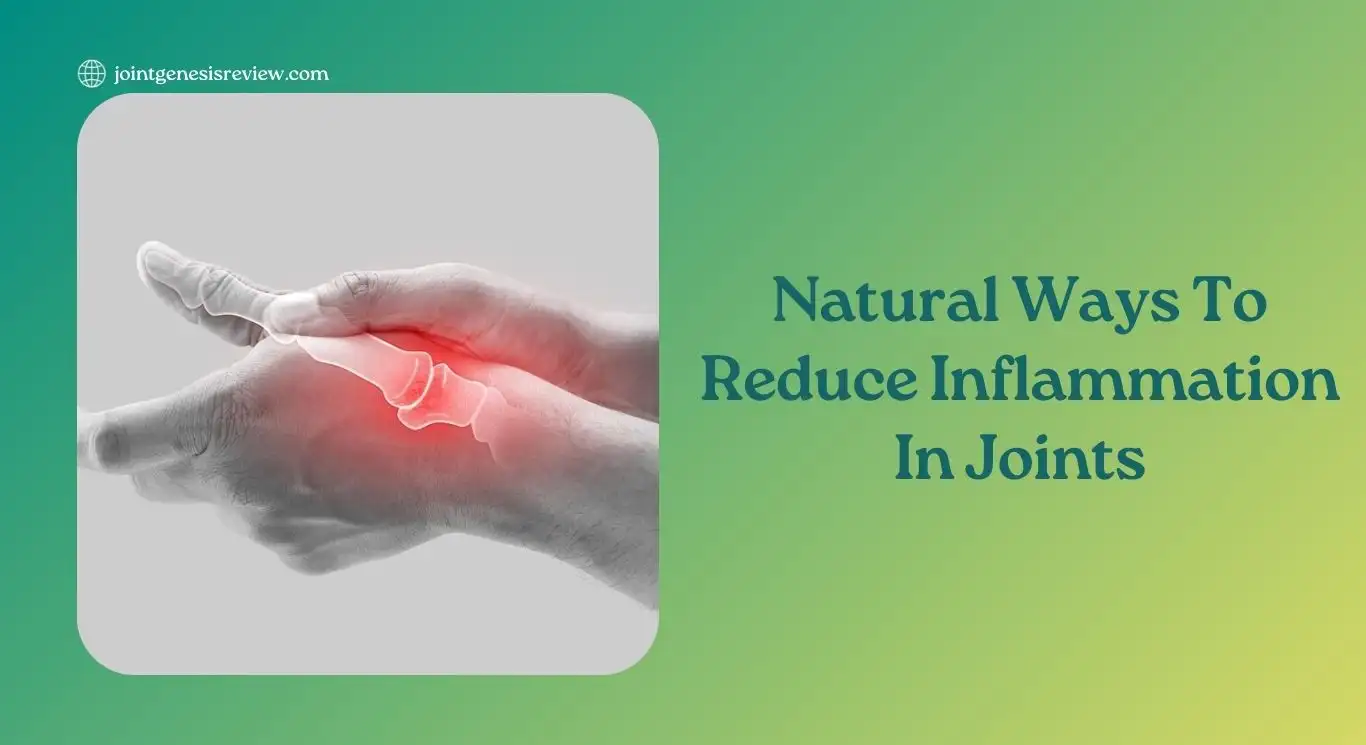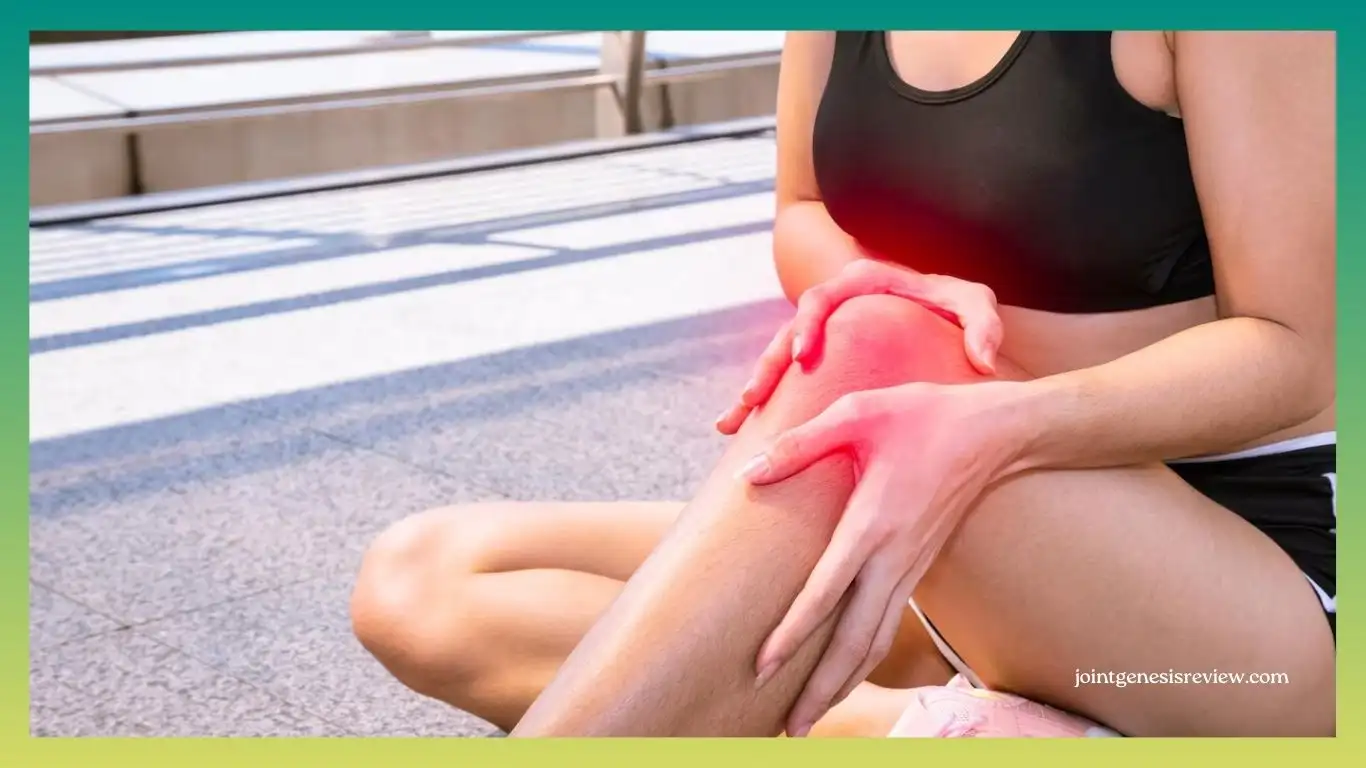Natural Ways To Reduce Inflammation In Joints In Just 24 Days
Explore effective strategies for soothing joint inflammation naturally. From dietary adjustments to herbal remedies, discover a range of holistic approaches to alleviate discomfort and promote joint health. Delve into the science behind anti-inflammatory foods and supplements, alongside lifestyle changes that can support your joints’ well-being. Whether you’re managing arthritis or seeking preventive measures, learn how to reduce inflammation in joints through gentle, natural methods.

Disclaimer: This article has been generated with the assistance of AI tools. While our research team has fact-checked the content, readers should independently verify information for accuracy and reliability.
Chronic joint inflammation can be debilitating, leading to pain, stiffness, and reduced mobility. While medication can provide relief, many people seek natural alternatives to manage inflammation without the potential side effects of drugs. Fortunately, numerous natural approaches can help alleviate joint inflammation and improve overall joint health.

Turmeric
Turmeric, a vibrant spice commonly used in Indian cuisine, contains a powerful compound called curcumin, which has potent anti-inflammatory properties. Curcumin has been shown to reduce inflammation in joints by blocking the production of inflammatory molecules and enzymes. You can incorporate turmeric into your diet by adding it to curries, soups, or smoothies, or by taking a curcumin supplement.
Fish Oil
Omega-3 fatty acids found in fish oil have been extensively studied for their anti-inflammatory effects. These healthy fats can help reduce joint inflammation by blocking the production of inflammatory compounds and reducing oxidative stress. Consider taking a high-quality fish oil supplement or increasing your intake of fatty fish like salmon, mackerel, and sardines.
Massage
Massage therapy can be an effective natural remedy for joint inflammation. Gentle massaging techniques can increase blood flow to the affected area, promoting the delivery of oxygen and nutrients while flushing out metabolic waste products that contribute to inflammation. Regular massages can also help reduce muscle tension, which can exacerbate joint pain.
Acupuncture
Acupuncture, an ancient Chinese practice, involves the insertion of thin needles into specific points on the body to promote healing and balance. While the mechanisms are not fully understood, acupuncture has been shown to reduce inflammation in joints by modulating the immune system and altering the production of inflammatory molecules.
Exercise
Regular, low-impact exercise can be beneficial for reducing joint inflammation. Activities such as walking, swimming, and cycling can improve joint mobility and flexibility while promoting the production of anti-inflammatory compounds in the body. It’s essential to consult with a healthcare professional before starting an exercise routine, especially if you have severe joint inflammation.
Green Tea
Green tea is rich in polyphenols, particularly a powerful antioxidant called epigallocatechin gallate (EGCG), which has been shown to have potent anti-inflammatory effects. EGCG can inhibit the production of inflammatory molecules and enzymes, helping to reduce joint inflammation and associated pain.
Glucosamine
Glucosamine is a natural compound found in cartilage that plays a crucial role in joint health. It has been shown to have anti-inflammatory properties and may help repair and rebuild damaged cartilage. Glucosamine supplements are widely available and can be found in various forms, including pills, powders, and liquids.
Ginger
Ginger is a versatile root that has been used for centuries in traditional medicine for its anti-inflammatory properties. It contains compounds called gingerols and shogaols, which can inhibit the production of inflammatory molecules and enzymes. These properties make ginger a promising natural remedy for those seeking to alleviate joint pain and improve their overall quality of life. You can incorporate ginger into your diet by adding it to teas, smoothies, or cooking, or by taking a ginger supplement.
Meditate
Meditation and mindfulness practices can be powerful tools for reducing inflammation in joints. By promoting relaxation and reducing stress, meditation can lower the production of inflammatory molecules in the body. Additionally, meditation can help individuals better manage pain and improve overall well-being.
Weight Loss
Excess weight can put additional strain on joints, exacerbating inflammation and pain. Achieving and maintaining a healthy weight through a balanced diet and regular exercise can significantly reduce joint stress and inflammation.
Boswellia
Boswellia, also known as Indian frankincense, is an herbal extract derived from the Boswellia serrata tree. It contains boswellic acids, which have potent anti-inflammatory properties and can help reduce joint inflammation and associated pain. Boswellia supplements are widely available and can be a natural alternative to over-the-counter anti-inflammatory medications.
Heat And Cold
Applying heat or cold therapy to inflamed joints can provide relief by reducing inflammation and pain. Heat therapy can improve blood flow and promote relaxation, while cold therapy can constrict blood vessels and reduce swelling. Alternating between heat and cold can be an effective natural treatment for joint inflammation.
Topical Medication
Topical creams and ointments containing natural anti-inflammatory compounds like menthol, camphor, and capsaicin can be applied directly to the affected joints for localized relief. These topical medications can help reduce inflammation and pain without the systemic effects of oral medications.
Capsaicin
Capsaicin is the compound responsible for the heat in chili peppers. When applied topically, it can help reduce joint inflammation by depleting a neurotransmitter called substance P, which is involved in the transmission of pain signals. Capsaicin creams and patches are available over-the-counter and can provide relief for joint inflammation and associated pain.
Olive Oil
Olive oil is a rich source of healthy monounsaturated fats and antioxidants, which can help reduce inflammation throughout the body, including in the joints. Consuming olive oil regularly, either through cooking or as a supplement, can contribute to an anti-inflammatory diet and promote overall joint health.
Aloe Vera
Aloe vera is well-known for its soothing properties and has been used for centuries to treat various inflammatory conditions. It contains compounds like acemannan and anthraquinones that can help reduce inflammation and promote healing. Aloe vera gel can be applied topically to inflamed joints or taken orally as a supplement.
CBD
Cannabidiol (CBD), a compound derived from the cannabis plant, has gained popularity for its potential anti-inflammatory and pain-relieving properties. CBD can interact with the body’s endocannabinoid system, which plays a role in regulating inflammation and pain perception. CBD oils, tinctures, and topical creams are available in various forms and concentrations.
Cinnamon
Cinnamon is a warm, aromatic spice that contains compounds with potent anti-inflammatory properties. Cinnamaldehyde, the primary active compound in cinnamon, has been shown to inhibit the production of inflammatory molecules and enzymes, making it a potential natural remedy for joint inflammation.
Fruits
Many fruits, including cherries, blueberries, strawberries, and pineapple, are rich in antioxidants and anti-inflammatory compounds. These fruits can help reduce oxidative stress and inflammation in the body, contributing to better joint health. Incorporating a variety of colorful fruits into your diet can provide a natural source of anti-inflammatory nutrients.
Nuts
Nuts like almonds, walnuts, and pistachios are excellent sources of healthy fats, protein, and antioxidants, all of which can contribute to reducing inflammation in the body. Additionally, nuts contain compounds like ellagic acid and plant sterols that have anti-inflammatory properties.
Tai Chi
Tai Chi is a gentle form of exercise that combines slow, flowing movements with deep breathing and meditation. This ancient Chinese practice can help reduce joint inflammation by improving flexibility, promoting relaxation, and reducing stress levels.
TENS
Transcutaneous electrical nerve stimulation (TENS) is a non-invasive technique that uses low-voltage electrical currents to stimulate nerves and reduce pain perception. TENS can be applied to inflamed joints and may help reduce inflammation and associated pain.
Yoga
Yoga is a mind-body practice that combines physical postures, breathing exercises, and meditation. Regular yoga practice can help reduce joint inflammation by improving flexibility, reducing stress, and promoting overall well-being. Certain yoga poses and sequences can be particularly beneficial for individuals with joint inflammation.
Other Supplements
In addition to the supplements mentioned above, several other natural compounds may help reduce joint inflammation, including bromelain (found in pineapple), resveratrol (found in grapes and red wine), and quercetin (found in apples, onions, and berries). Always consult with a healthcare professional before starting any new supplement regimen. Always discuss new supplements with your doctor, but JointGenesis provides an all-in-one formula specifically designed to support joint health and mobility.
Ending note
By incorporating these natural remedies into your lifestyle, you can take a proactive approach to managing joint inflammation and promoting overall joint health. However, it’s essential to consult with a healthcare professional, especially if you have a pre-existing condition or are taking any medications, as some natural remedies may interact with certain medications or have contraindications.
References
Alex Milan
Alex Milan is a licensed osteopath and acupuncturist based in United States. He graduated from the British School of Osteopathy in 2017, where he received extensive training in osteopathic techniques for treating musculoskeletal conditions. Alex is passionate about providing patients with holistic, drug-free pain relief and enabling people to live active, healthy lives. He utilizes osteopathic manipulative techniques along with acupuncture and lifestyle advice to address the root causes of pain and dysfunction in the body. With expertise in areas including sports injuries, back and neck pain, headaches, and repetitive strain injuries, Alex has helped numerous patients find relief from pain and return to their regular activities.
